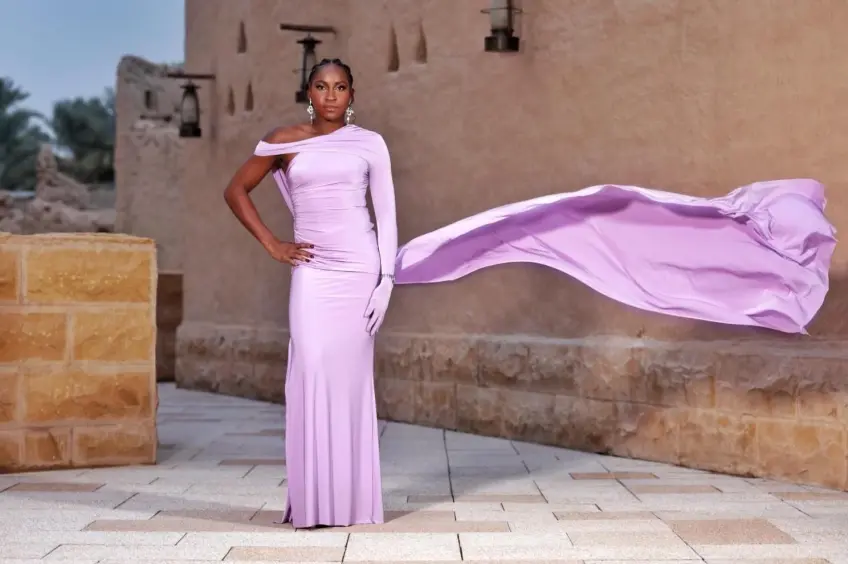
Saudi Arabia is making significant strides in the world of tennis, marking its debut in the international sports scene through a groundbreaking partnership with the ATP (Association of Tennis Professionals). This collaboration, facilitated by the Public Investment Fund (PIF) of Saudi Arabia, has opened the door to a series of high-profile events, including the extravagant exhibition match known as the Six Kings Slam. Furthermore, the country is set to host the prestigious WTA Finals in Riyadh, where a select group of elite players, including the rising American star Coco Gauff, will compete.
As the year-end championships approach, Gauff, who has quickly become one of the most recognizable faces in women’s tennis, participated in a media day that drew attention not only for her athletic prowess but also for her candid discussions on sensitive topics. During the press conference, she spoke openly about women’s rights and LGBTQ+ issues in Saudi Arabia, highlighting the complexities of navigating these discussions in a cultural context that is markedly different from her own.
“I’m very aware that we’re not going to come here and change everything. It would be very naive to say that,” Gauff stated, acknowledging the intricate dynamics of social change. She emphasized the importance of a nuanced conversation, recognizing that while progress may be slow, every dialogue contributes to a larger understanding. Gauff elaborated on her discussions with various women in Saudi Arabia, including Princess Reema, a prominent advocate for women’s rights in the kingdom. “We’ve talked to a lot of women here in Saudi Arabia. One of them was Princess Reema. A lot of calls with her, about how the best approach would be to come into this different place that women have never been, women in the United States have never been,” she said.
Gauff’s reflections are particularly poignant in the context of the ongoing discourse around women’s empowerment in the region. She expressed her concerns about LGBTQ+ issues and women’s rights, making it clear that athletes have a role to play beyond the court. “I would be lying to you if I said I didn’t have reservations,” she admitted. “I’ve been on pretty much every player call that I’ve been able to with the WTA. One of the things I’ve said, if we come here, we can’t just come here and play our tournament and leave. We have to have a real program or a real plan in place.”
This emphasis on meaningful engagement rather than mere participation speaks volumes about the responsibilities that athletes like Gauff feel in representing not just themselves but also broader social movements. Her commitment to advocating for change within a framework of respect and understanding exemplifies a progressive mindset that seeks to bridge cultural divides through sport.
In addition to her advocacy work, Gauff shared her personal passion for music, specifically her admiration for pop superstar Taylor Swift. The young athlete revealed her long-standing fandom, stating, “I have tickets to go back this year. I hope she performs that song. It would be really cool to see her live.” She reminisced about seeing Swift perform for the first time when she was just 15 years old and attending Swift’s music festival the previous year. This blend of athletic commitment and personal interests showcases Gauff’s relatable persona, appealing to fans both on and off the court.
As Saudi Arabia continues to establish its presence in global tennis, the implications of such partnerships extend beyond the realm of sports. Hosting the WTA Finals and engaging athletes like Coco Gauff presents an opportunity for the kingdom to reshape its international image, especially regarding women’s rights and social issues. The participation of prominent figures in tennis and the conversations they inspire could potentially foster a more progressive dialogue within the country.
Coco Gauff’s participation in this unique moment in tennis history serves not only to elevate her career but also to shine a light on the pressing issues that athletes face as they navigate their roles as influencers and advocates. The convergence of sports, culture, and social justice in this context reflects a broader trend in which athletes are increasingly using their platforms to address important issues, advocating for change while continuing to excel in their respective fields.
As the WTA Finals approach, all eyes will be on Riyadh, not just for the tennis but for the conversations that will unfold and the potential impact on women’s rights and social justice in Saudi Arabia and beyond. With athletes like Gauff leading the way, there is hope that sports can be a catalyst for change, fostering understanding and growth in places where dialogue is crucial.
Leave a Reply